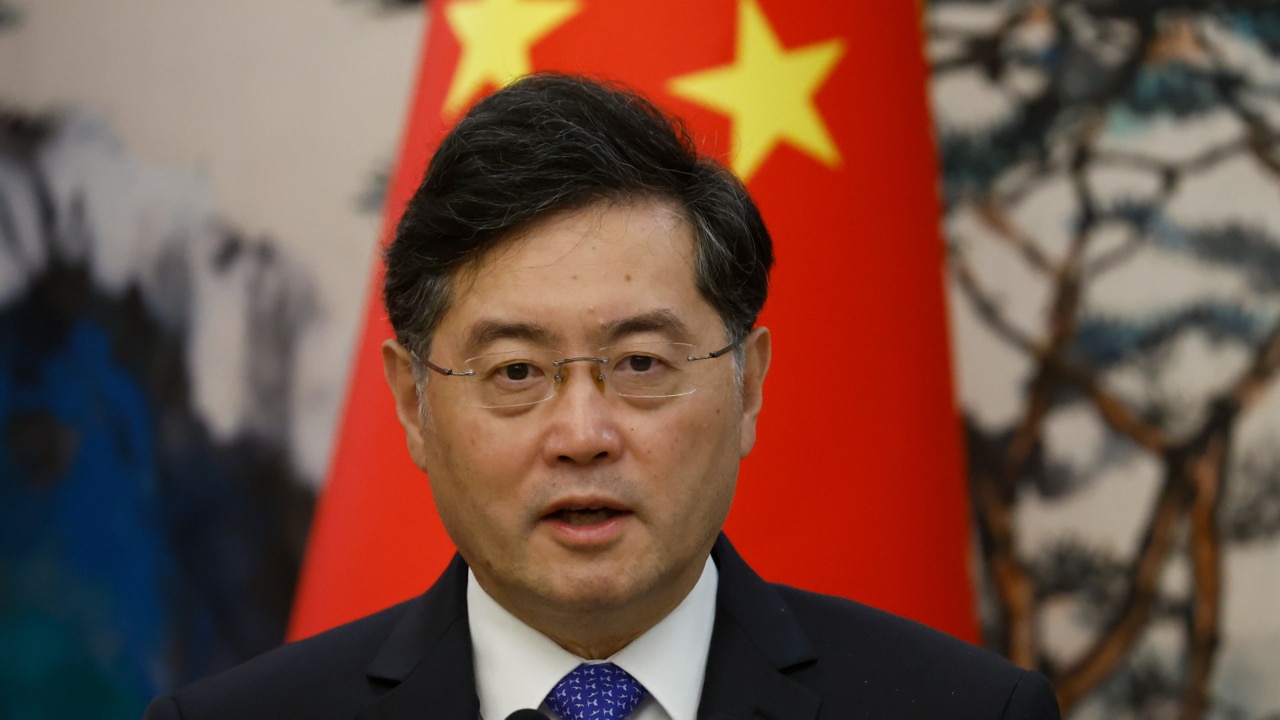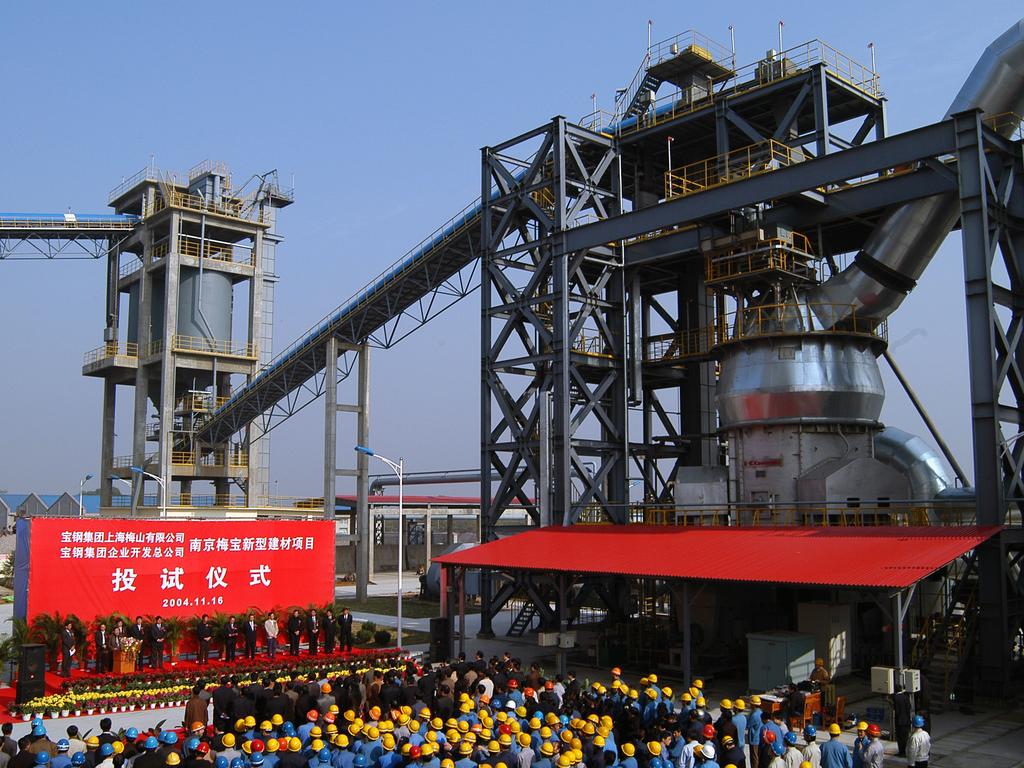Chinese foreign minister Qin Gang removed from office
Qin Gang has been removed from office, state media reports, after vanishing from public for a month with little explanation.

Chinese leader Xi Jinping removed his handpicked foreign minister after less than seven months on the job, a surprise move that leaves more questions than answers around China’s black-box political system.
Qin Gang’s removal comes after his mysterious absence from the public stage over the past month, a disappearance that has sparked speculation about his fate and cast a global spotlight on the Communist Party’s opaque governance of the world’s second-largest economy.
At a hastily convened session Tuesday, the Chinese legislature’s standing committee decided that Wang Yi, the former foreign minister and currently China’s top diplomat, would retake his old post, which he had relinquished late last year.
The lawmakers didn’t provide a reason for their decision to remove the 57-year-old Qin, who had succeeded Wang after enjoying an unusually rapid rise through the foreign-service ranks in recent years. Qin’s absence from major diplomatic engagements since late June had fueled rumors inside and outside China about what happened to him.
China’s Foreign Ministry previously cited health reasons for Qin’s absence from a regional diplomatic meeting in Indonesia earlier this month.
Wang, a 69-year-old member of the Communist Party’s elite 24-member Politburo, served as foreign minister from early 2013 until December last year. He became China’s top diplomat when he joined the Politburo in October as its leading foreign-affairs specialist.
In China’s political system, the foreign minister isn’t necessarily the country’s highest-ranking diplomat. That role resides with the most senior foreign-policy official by party rank, who is currently Wang, the director of the office of the party’s Central Foreign Affairs Commission.
State media reports didn’t mention any change to Wang’s party roles, suggesting he would occupy his Politburo and Foreign Ministry positions concurrently -- an arrangement that has in the past taken place during a transition period between officeholders.
Political analysts say Wang’s return as foreign minister appears to be an interim appointment to buy time while Xi and other senior officials figure out longer-term arrangements.
“Qin’s removal shouldn’t be interpreted as a diminishment of Xi Jinping’s power, which extends far wider and deeper than any one single appointment,” said Jude Blanchette, a China analyst at the Washington-based Center for Strategic and International Studies. “And the fact that, for now, Qin keeps some of his party and government positions indicates that there are some unresolved internal issues.” State media readouts from Tuesday’s session of the National People’s Congress standing committee didn’t mention any change to Qin’s role as state councilor, a senior government rank in the State Council, China’s cabinet. The State Council’s website continued to list Qin as a state councilor as of Tuesday evening.
Party authorities haven’t announced any change to Qin’s status as one of 205 full members of the party’s Central Committee, which he joined in October while he was China’s ambassador to the U.S.
Tuesday’s legislative session was arranged just one day in advance, an unusually short notice, and outside the typical two-month cycle for regular standing committee sessions. This extraordinary session came right after a Politburo meeting on Monday, chaired by Xi.
“Overall foreign policy won’t likely change in the wake of Qin’s removal, as his role was simply to implement key decisions made by Xi Jinping,” said Blanchette.

The mystery around Qin has prompted new questions about China’s governance under Xi, whose Communist Party has doubled down on its penchant for secrecy and frustrated outsiders’ efforts to access information about developments in a leading economic powerhouse.
Considered a trusted aide to Xi, Qin had enjoyed an unusually rapid rise within China’s foreign service in recent years after serving as protocol chief for the Chinese leader. Qin was appointed Beijing’s ambassador to Washington in 2021 despite having no formal background directly handling U.S. relations, before joining the Central Committee and winning promotion to foreign minister late last year -- bucking precedent in a system that traditionally has valued experience in addition to political connections.
Political analysts say Qin’s close association with Xi has made his absence particularly intriguing. A dearth of information about Qin’s whereabouts has fueled speculation on social media, including around the possibility of an extramarital affair.
The Chinese foreign ministry first addressed Qin’s disappearance on July 11, when it said at a regular news briefing that he wouldn’t attend an international gathering of foreign ministers in Jakarta because of health reasons, without giving any details. Since then, the ministry’s spokespeople have generally sidestepped questions about Qin.
In China’s opaque political system, health issues are often cited as the reason for a senior official’s absence. While the explanation is often genuine, party insiders say, it can sometimes serve as cover for political problems.
When Wang Lijun, the former police chief in the inland megacity of Chongqing, went missing in February 2012, municipal authorities said he was taking “vacation-style treatment” for stress and overwork, though in reality he had fled to the U.S. consulate in the nearby city of Chengdu to seek asylum.
Beijing’s move to replace Qin as foreign minister won’t quell speculation around his fate, since it leaves many questions about what caused his prolonged absence, said Alfred Wu, an associate professor at the Lee Kuan Yew School of Public Policy in Singapore.
At Tuesday’s legislative session, lawmakers also named Pan Gongsheng as governor of the People’s Bank of China. The move had been expected after the 60-year-old Pan, who had been deputy governor since 2012, was appointed as the central bank’s top party official earlier this month.
The veteran economist and banker had been getting ready to retire in the weeks before Xi picked him to lead the central bank at a time when the Chinese yuan has been on a downward slide, The Wall Street Journal has reported.
The Wall Street Journal







To join the conversation, please log in. Don't have an account? Register
Join the conversation, you are commenting as Logout